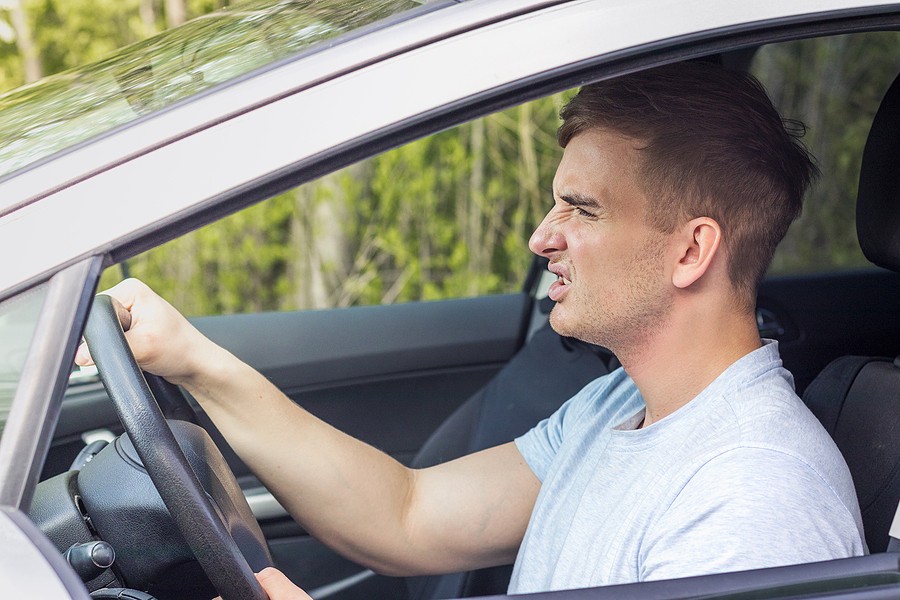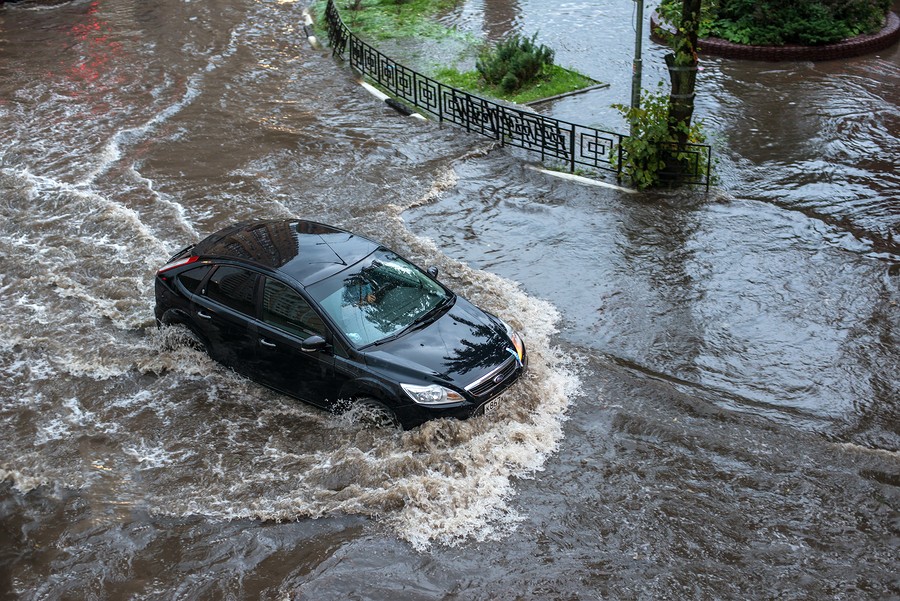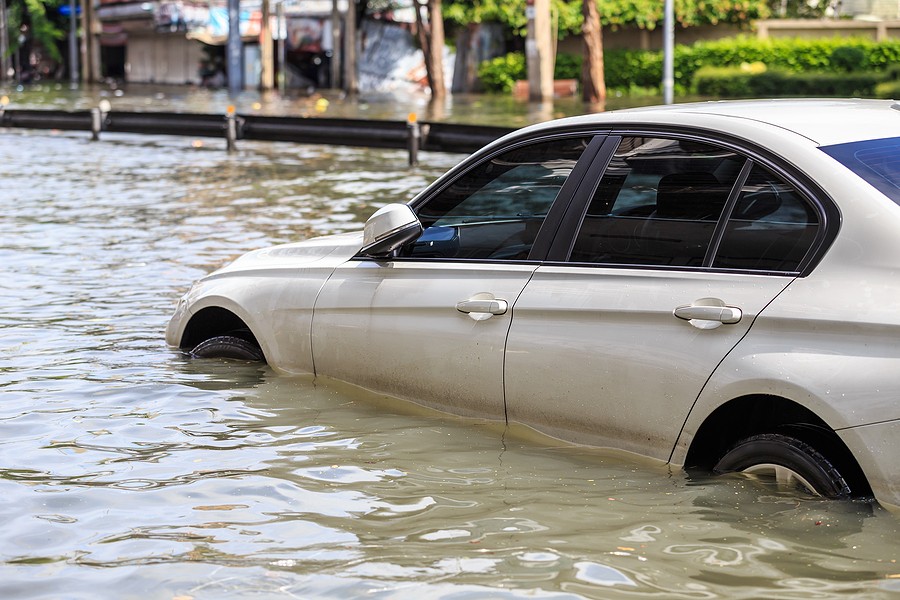Here are the 10 tips to help you how to protect your car during a hurricane:
- Avoid driving in flood
- Keep extra fuel
- Choose your parking area
- Protect your documents
- Check the fluid levels
- Inspect the tire pressure
- Prepare a first aid kit
- Secure the windows
- Take pictures before and after the flood
- Follow recommendations and stay safe
Owning a vehicle is a responsibility. You have to change the oil and do the required maintenance between now and then, depending on your vehicle type.
However, there are situations where you need to be proactive about bigger problems, not those related to mechanical issues in your vehicle, like dealing with hurricanes.
Natural disasters are not rare now and are not something you only hear in the news. It's happening in our homes and many locations, like what's going on with hurricane Ian around Florida.
This article provides you with 10 tips to help you how to protect your car during a hurricane. Read on for more details and protect your vehicle during the hurricane as much as possible.

How to protect your car during a hurricane? 10 tips
When dealing with hurricanes, people only focus on their lives which is the highest priority, and probably their properties, but less focus is related to vehicles, unfortunately.
It is not surprising, however, that vehicles will be at the bottom of the list, considering that hurricanes can cause more severe disasters that could result in losing lives.
From what we're learning around the world and from the recent hurricane Ian striking Florida, automotive experts put together a list of 10 tips on protecting your car during a hurricane.
Of course, these tips might work for some people and might not be feasible for many people, especially in areas where the hurricane is extremely intense. However, this doesn't mean that you cannot implement any of them, and we highly encourage you to implement as many as possible to help protect your car as much as possible and save your investment.
1- Avoid driving in flood
When you are in a hurricane area, the first thing you want to do is to avoid driving in flooded areas. However, when you take your vehicle inside the water and keep driving it, chances are that will make things worse, and you might get stuck in the middle of water where you can't fly.
When driving through a flood, problems with the vehicles become more complicated, and if you have a 1% chance to save your car by getting your vehicle stuck in the middle of the flood, you will end up with a completely damaged vehicle due to the flood.
Therefore, you might want to learn about the areas with rising water. If you are planning to leave your home, try choosing the right locations and consulting with the proper agencies to help understand what's happening around your different potential routes.
If all the routes are considered flooded, your better option is to leave your vehicle inside a closed garage and try protecting it inside your home rather than taking it outside and driving it.
Obviously, many emergency stakeholders and other agencies could help you leave your house, and you don't necessarily need to take your vehicle to leave the area and go to a safer place.
2- Keep extra fuel
Assuming that your area is not completely flooding and there is a hurricane coming closer to your area, then one of the things that you need to consider is to keep extra fuel.
We mentioned earlier that you were not recommended to drive during the hurricane and not recommended to go through the flood water. That's why to consider filling up your gas tank and having an extra one or two tanks in your garage in emergencies.
You might not necessarily need to drive the vehicle, but you never know what's the situation and the last thing you want to do is to get stuck in the house or have a chance to leave with your vehicle, but you can't take it because you don't have enough fuel.
During the emergency, you'll be focusing on more other stuff, and many people could be panicking, so it's very unlikely that people will focus on filling their gas tanks or looking into their vehicles. Therefore, if you can do that before things get closer, you can save yourself a lot of hassle.

3- Choose your parking area
If, for whatever reason, you couldn't drive your vehicle outside of the flooded area, you want to be very mindful about where to park your car. There are many locations that we've discussed in detail in a different article, but these include:
- A closed garage
- A secured barn
- Driveway
- Next to buildings
- Public garage buildings
Every one of those locations has pros and cons, and experts recommend choosing your close garage because it's the place you are very familiar with, and you know its integrity.
Of course, taking your vehicle with you without needing to drive through a flood could be a good situation. Still, you got to be allured to any potential hazards around you, and you should follow the recommendations from the experts about whether you should drive or not.
4- Protect your documents
As we all know, our vehicles typically contain important documentation like your vehicle's registration and other related paper works related to the insurance policy. In that case, you must protect your documents in a waterproof envelope or plastic bag.
Imagine what could happen if all these documents get soaked in water without you paying attention. It can be extremely challenging, and you don't want to hassle trying to obtain new copies of the documentation because they take forever, especially if your area is in a disaster like a hurricane.

5- Check the fluid levels
Before the hurricane hits, you must check your vehicle's fluid levels. Most automotive experts indicated that many car problems happen because of insufficient fluids, whether this fluid is a coolant, fuel, or other.
That's why you must look at every fluid and understand whether it's at the optimum level or not. You might even want to top off certain fluids just in case before they hit the minimum point and before your vehicle deals with major complications.
Some fluids could be extremely important, especially the wiper fluid, because you might need it during a hurricane if you had to drive at any distance. You also want to check on the coolant because it can lead to major engine damage if it's not at the optimum level.
6- Inspect the tire pressure
The other thing you want to look at is your tire pressure. Again, we indicated that you might not need to drive during the flood, but there are situations where you must fleet certain areas before the water rises, and you still have a chance to drive on clear roads.
When there's a lot of water out there, you want to ensure that the tire pressure is at the optimum level so your vehicle serves as much as possible. When the tire is not inflated properly, it makes your driving experience a bit more challenging on top of the challenges you're dealing with related to the flood and the hurricane.
Therefore, one of the very important tips we would like to provide you in this article on how to protect your car during a hurricane is ensuring you have proper tire pressure.

7- Prepare a first aid kit
Drink any emergency; whether it's a hurricane or anything else, you must familiarize yourself with the different aid kits. Sometimes you might get stuck inside the vehicle, and things could be uncomfortable, or you might need help during certain situations.
That's why you might want to spend some time looking at the top aid kits you can put inside your car in emergencies like those related to Hurricanes.
There are many lessons learned from what happened in hurricane Ian around Florida. In addition, many people who survived the flood might have good recommendations on what type of aid kits you should have in your vehicle.
8- Secure the windows
If you leave your car parked outside or don't have a secured closed garage, experts recommend securing the windows as much as possible. You can use lots of reinforced material to keep the windows from blowing out, but you can use duct tape and put it in a cross-shape pattern around the windows, so they don't blow up.
You don't want to deal with broken windows during the flood because it not only impacts your safety but also allows more water to get inside your vehicle and cause further problems.
If your vehicle has water inside, it becomes much more challenging to fix because the whole upholstery will smell like water. In addition, finding potential buyers to buy your vehicle and lose your entire vehicle can be very challenging.

9- Take pictures before and after the flood
Do you know that experts recommend taking pictures of your vehicle before the flood?! This is a very critical thing to do because if, for whatever reason, your vehicle got flooded, you want to have proof from your insurance company that the vehicle was in good condition before things got worse.
Taking pictures of the vehicle helps you make the case. So fast is the process of filing your claims and getting back money from your insurance company rather than trying to calm down from the hurricane versus convincing the insurance company about your vehicle status.
10- Follow recommendations and stay safe
Finally, although the mentioned nine recommendations above help you protect your vehicle during a hurricane, we still recommend you listen to available local news and other recommendations by experts on safety.
Yes, maintaining your vehicle and protecting your property is critical, but staying safe is the most important and staying as calm as possible is more critical.
Therefore, if it needed that you leave your vehicle completely in flood, it's more important that you focus on your life and the lives of the people living with you rather than trying to protect your vehicle.

Final thoughts
Natural disasters are increasing over the years and what's happening around Florida with hurricane Ian is devastating!
One of the many things that people under look is protecting their vehicles during the hurricane, and they end up with major damages to their cars, causing them to lose one of their most expensive assets, their vehicles.
This article discussed 10 tips for protecting your car during a hurricane. Obviously, these tips might work for some people but might not work for others, and that's why we encourage you to implement as many of those as possible to help save your investment and protect your vehicle.
If your vehicle gets completely flooded in a hurricane like a hurricane Ian, unfortunately, you're only option would be to sell this car and buy a better one.
Are you looking for someone to buy your car and find it challenging to sell to potential private buyers? Why don't you reach out to Cash Cars Buyer?!
Cash Cars Buyer is one of the top-rated car removal companies in the nation that guarantees to pay you the top dollars and provide you with free towing despite your living location around the United States.
Our process is very straightforward and doesn't take more than a couple of days to get your car removed safely and for the most money.
All it takes you is to:
- Describe your car's type and condition
- Receive our instant free quote
- Accept the quote
- Get your car removed and receive your cash payment on the spot!
To learn more about our process and our team, you can reach out to us by calling us at (866) 924-4608 or by visiting our home page click on the free instant online offer.



